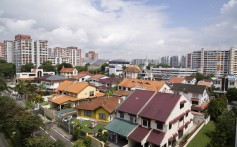https://www.scmp.com/comment/opinion/article/3222307/why-singapore-superior-hong-kong-almost-every-way?module=AI_Recommended_for_you_In-house&pgtype=homepage_asia
Corrected [11:36pm, 30 May, 2023]
It’s amusing to read comments by local property tycoon Ronnie Chan Chi-chung about places such as Singapore being “artificial”, “charmless” and “super boring”. Hong Kong, on the other hand, has the six “Gs” that are its unique advantages: genetics, geography, a culture of giving, the GBA (Greater Bay Area), its government and grey matter.
Really? The problem with tycoons everywhere, and not just in Hong Kong, is that they feel free to pontificate because they are rarely challenged, well, not in their face anyway. So I am glad reader John Chan of Singapore has written a rebuttal, pointing out that the city state enjoys both higher per capita gross domestic product (GDP) and median monthly household income. It’s doing very well, thank you very much!
Maybe Ronnie Chan can counter, as you would if you are a tycoon, that the capitalisation of Hong Kong’s stock market far exceeds that of Singapore or that the latter’s IPO market is minuscule compared to his city’s. Hong Kong has Disneyland, but hey, they have Universal Studios.
But all these comparisons are superficial.
The fundamental fact is that Singapore is a city state, rather than just a city. That means it has had to struggle with all the trials and tribulations, the dangers and pressure of statehood in a region that only grew richer and more stable in the last few decades. Indeed, the success of Singapore contributed greatly to regional and diplomatic stability and prosperity.
Hong Kong? Having grown rich under the tutelage of British colonialism, it has been protected and managed to prosper by riding on the coattails of an economically resurgent China. It has always had the Chinese hinterland to lean on.
Singapore, by contrast, was forced out of a federation by a hostile Malaysian hinterland and has had to defend itself in the whirlwinds of geopolitics from the Cold War, and now again, from the intensifying rivalry between the United States and China in the region. The birth and survival of Singapore, let alone its economic success that became a model for Deng Xiaoping’s economic reforms and opening, was already by itself a miracle. And now, with other Asean nations, Singapore is again playing a significant role in helping to moderate the Chinese-American rivalry from spiralling out of control. In international politics, it has always punched well above its weight.
Where is Hong Kong in all this? Well, it’s a bystander, and occasionally a victim in the fight between two of the world’s biggest powers. It has always amazed me that Singapore understands the need to deal diplomatically and in a balanced way with China and the US. Meanwhile, many Hong Kong people and the opposition went out of their way to provoke Beijing at every opportunity over the last two decades, even by appealing for Western support. Now in exile, some still do.
People who grew up pampered have no sense of self-preservation or lose their instinct for survival. Fortunately for the city, the 21st century communist state of China is more a strict parent than a murderous beast. The question about the draconian national security law is not why it was imposed in 2020, but that Beijing kept its end of the bargain and did not introduce something like it until after the city was plunged into complete chaos in 2019.
So where did Hong Kong people get their superiority complex over Singapore, as they do over mainlanders? Well, my generation that grew up from the 1960s were taught, first by the British colonials then by the Western media, that our city was more Western, fun-loving and freewheeling than boring and underdeveloped Singapore. The colonial government might have denied us democracy but it allowed us personal freedom. Singapore? You couldn’t even chew gum. And that Lee Kuan Yew, what a dictator! People may not remember, but the relentless criticism, negative media coverage and constant ridicule from the West against Lee’s Singapore wasn’t so different from those that were subsequently levelled at China.
But Lee and other successful authoritarian Asian leaders long understood something fundamental that the West didn’t, at least until recently. Blame it on the West’s obsession with neo-liberal economics and democratic development theory, and of course, presumed cultural superiority. Time and again in Asia, it was shown that you need a strong state to lead and pull up a poor people and country by the bootstraps. And yes, this may be understood as a utilitarian argument, the greatest happiness or at least benefit for the greatest number; or a collectivist one as opposed to individualism. That may also mean infringing on individual liberties, but it’s not like British colonialism had a lot of respect for them either.
Because of the forced separation from Malaysia, Singapore from its inception has been a multi-ethnic society. People were therefore taught to be much more racially tolerant. Hong Kong, let’s face it, has always been a racist society. The majority ethnic Chinese learned from the way they were treated by the British colonials and other whites, and projected the same treatment onto people of darker skins. What the Brits taught us was racial hierarchy. We looked down on mainlanders when they were poor; we looked down on them when they became rich and powerful and began to lord over us. A superiority complex can easily degenerate into a superiority-inferiority complex, which can be much worse.
By any international standards of human and economic development, Singapore is either on par with or better than Hong Kong. Home ownership in Singapore is almost 89 per cent, compared with less than 50 per cent here. Eighty per cent of Singaporeans live in public housing. Such flats for a family average under 1,000 sq ft. Hong Kong? Let’s not embarrass ourselves.
Singapore has a central bank that pegs its currency against an undisclosed basket of currencies. Hong Kong has a much easier job, with a currency board pegged to the US dollar alone, which pretty much means automatic monetary adjustment. And thank God for that; can you imagine some Hong Kong bureaucrat looking at computer screens all day fretting whether to raise, keep steady or drop interest rates? That’s enough to scare off the most fearless investors.
Now I don’t know much about Singapore’s public health, education, and pension and retirement systems, but I assume they can’t be worse than those in Hong Kong. They may speak funny English but I find them to be much more grammatical.
Singapore has civil servants, politicians and diplomats because they run a real country; Hong Kong has only civil servants, though some of them pretend to be politicians. The incompetence of the local government was not the only, but at least a very big factor, behind the 2019 riots. Quite simply, there is no comparison between running a nation and a city.
People are always asking what caused the riots in Hong Kong. Perhaps it’s equally important to ask why something like that would probably never happen in Singapore.















Comments
Post a Comment